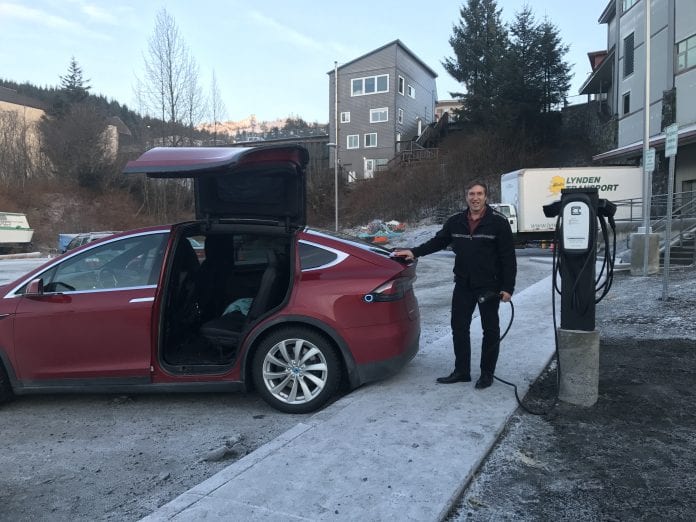
Editor’s Note: As Cordova prepares for a future when electric vehicles will come more into vogue, Cordova Mayor Clay Koplin, who is also the chief executive officer of the Cordova Electric Cooperative, offers questions and answers on this step into evolving technology.
Q: Why install electric vehicle (EV) charging stations, are there any electric vehicles in Cordova?
A: There are two electric cars that I know of, but the chargers are a longer-term investment that serves the Cordova residents and businesses that are considering an EV now and have asked how they can get an emergency charge if they run low in town. It also fits well into CEC’s plans for transitioning to 90 percent renewable by 2025 and 100 percent in the future. CEC spills an estimated 4 million kWh of excess renewable energy a year from our run-of-river hydro plants, enough to power approximately 1,300 EVs year-round on Cordova’s short road system. We spilled an estimated 400,000 kWh in the December rainstorms alone.
Q: Why is using the chargers free, doesn’t this mean everyone has to help pay for it whether they have an EV or not?
A: After research, CEC discovered that it is much more costly to bill EVs for charging station use than the electricity is worth unless it is a very high volume such as city parking garage chargers. CEC also found that in wet locations, EV charger credit card readers and other electronics do not hold up well. CEC settled on an inexpensive but well-built brand with an industry-leading 5-year full warranty. CEC views the stations as a service to the community and visitors, and not charging for the service is the most cost-effective approach for now.
Q: What do you mean “visitors”?
A: Alaska EV owners “rally” to communities where they know electric chargers are available or go solo. Although Cordova is only accessible to vehicles by ferry, most of these visitors are Alaskans. Well-publicized EV charging stations will encourage visits to Cordova that might not otherwise happen and there is already a planning effort underway for a Tesla group trip to Cordova.
Q: Why install chargers now?
A: CEC has been monitoring the progress of electric vehicles and chargers for over 10 years, waiting for the technology to become a good fit for our environment and economy. In the past two years in particular, there have been rapid advances and widespread adoption of some of the latest makes and models of EVs and chargers, and they have come of age. In Juneau alone there are over 200 electric cars in a very similar climate and closed road system and the owners give them high praise. Cordova’s climate is similar to Juneau’s, and the gap between the cost of electricity and liquid fuels is similar. I will reference the Nissan Leaf because there is such a large user group in Juneau that has been graciously offering insights and suggestions this past year.

Q: What does is cost to charge an EV, and what is their mileage and range?
A: CEC installed Level 2 chargers, which can give an average car about 20 miles of range for $1.75 at average CEC rates on a one-hour charge. A typical Nissan Leaf with a 24 kWh battery, for example, has a range of between 76-84 miles on a full charge, which takes 3.5 hours. The Leafs have ranges between 3.4 and 4.4 miles per kWh depending on make and model and season; the heaters use more of the battery in winter.
Q: What happens if more EVs come to Cordova and there are more cars than chargers?
A: With a growing number of drivers switching to EVs, partly due to the $7,500 federal tax credit for purchasing a new EV, this is a common problem. Many manufacturers are sharply ramping up EV production, with some already committing to phasing out internal combustion engines as soon as 2019 (Volvo). Many communities are struggling to provide adequate charging stations for areas with longer commutes where they are forced to get a charge in town or city. In Cordova, with our small road system and short commutes, this will not present as much challenge. It is anticipated that most EV owners will install charging stations at their own homes for security and convenience.
Q: If I purchase an EV, how will I get it worked on or serviced?
A: In discussions with Juneau, they have reached a critical mass of owners and have Nissan Leaf service staff come their community about once a month. However, in following their Facebook user’s group, I have noted that most of the remedies are worked out at home with advice from other users. One thing they have noted is that Southeast Alaska is what they call the Goldilocks climate for batteries: not too cold, and not too hot. The Nissan factory staff was amazed at how little the batteries degraded in the cool climate, with batteries displaying zero degradation after 50,000 miles of use in Juneau. These technicians may be willing to hop on up the coast as Cordova, Petersburg, Sitka, and other southeast and southcentral communities make the switch to electric.
Q: I still don’t understand why free charging stations are being installed, where can I get more information?
A: CEC will answer questions directed to their website cordovaelectric.com, or Facebook page, and will be presenting additional information at the CEC annual meeting in March, and encourage all members to attend.
Find electric vehicle charging stations on the map at plugshare.com














